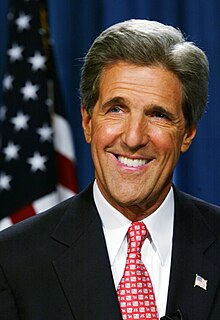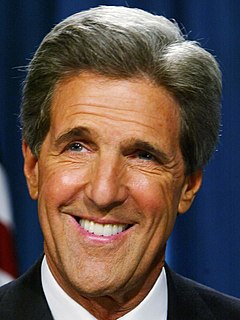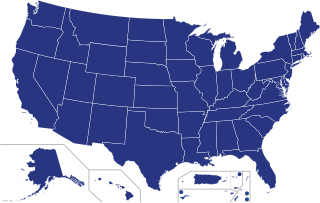
The 1972 United States presidential election was the 47th quadrennial presidential election. It was held on Tuesday, November 7, 1972. Incumbent Republican President Richard Nixon from California defeated Democratic U.S. Senator George McGovern of South Dakota. Until the 1984 election, this was the largest margin of victory in the Electoral College for a Republican in a U.S. presidential election.

The 2008 United States presidential election was the 56th quadrennial presidential election, held on Tuesday, November 4, 2008. The Democratic ticket of Barack Obama, the junior U.S. Senator from Illinois, and Joe Biden, the senior U.S. Senator from Delaware, defeated the Republican ticket of John McCain, the senior Senator from Arizona, and Sarah Palin, the Governor of Alaska. Obama became the first African American ever to be elected to the presidency as well as being only the third sitting United States Senator elected president, joining Warren G. Harding and John F. Kennedy.

Super Tuesday is the United States presidential primary election day in February or March when the greatest number of U.S. states hold primary elections and caucuses. Approximately one-third of all delegates to the presidential nominating conventions can be won on Super Tuesday, more than on any other day. The results on Super Tuesday are therefore a strong indicator of the likely eventual nominee of each political party.

The 2004 Republican presidential primaries were the selection process by which voters of the Republican Party chose its nominee for President of the United States in the 2004 U.S. presidential election. Incumbent President George W. Bush was again selected as the nominee through a series of primary elections and caucuses culminating in the 2004 Republican National Convention held from August 30 to September 2, 2004, in New York City.

The 2004 United States presidential election in New York took place on November 2, 2004, and was part of the 2004 United States presidential election. Voters chose 31 representatives, or electors to the Electoral College, who voted for president and vice president.
The following is a timeline of major events leading up to and immediately following the United States presidential election of 2008. The election was the 56th quadrennial United States presidential election. It was held on November 4, 2008, but its significant events and background date back to about 2002. The Democratic Party nominee, Senator Barack Obama of Illinois, defeated the Republican Party's nominee, Senator John McCain of Arizona.

Super Tuesday 2008, Super Duper Tuesday, Mega Tuesday, Giga Tuesday, Tsunami Tuesday, and The Tuesday of Destiny are names for February 5, 2008, the day on which the largest simultaneous number of state U.S. presidential primary elections in the history of U.S. primaries were held. Twenty-four states and American Samoa held either caucuses or primary elections for one or both parties on this date. Furthermore, the week-long Democrats Abroad Global Primary began on this day.
Presidential primaries have been held in the United States since 1912 to nominate the Republican presidential candidate.

The South Carolina primary is an open primary election which has become one of several key early-state presidential primaries in the process of the Democratic and Republican Parties choosing their respective general election nominees for President of the United States.

The 2004 New York Democratic primary took place on March 2, 2004, also known as Super Tuesday.

The 2000 Republican presidential primaries were the selection process by which voters of the Republican Party chose its nominee for President of the United States in the 2000 U.S. presidential election. Texas Governor George W. Bush was selected as the nominee through a series of primary elections and caucuses culminating in the 2000 Republican National Convention held from July 31 to August 3, 2000, in Philadelphia, Pennsylvania.

The 2008 United States presidential election in New Jersey took place on November 4, 2008, and was part of the 2008 United States presidential election. Voters chose 15 representatives, or electors to the Electoral College, who voted for president and vice president.

The 2012 United States presidential election in New York took place on November 6, 2012, as part of the 2012 United States presidential election in which all 50 states plus the District of Columbia participated. New York voters chose 29 electors to represent them in the Electoral College via a popular vote pitting incumbent Democratic President Barack Obama and his running mate, Vice President Joe Biden, against Republican challenger and former Massachusetts Governor Mitt Romney and his running mate, Congressman Paul Ryan.

The 2012 United States presidential election in Wisconsin took place on November 6, 2012, as part of the 2012 United States presidential election in which all 50 states plus the District of Columbia participated. Wisconsin voters chose 10 electors to represent them in the Electoral College via a popular vote pitting incumbent Democratic President Barack Obama and his running mate, Vice President Joe Biden, against Republican challenger and former Massachusetts Governor Mitt Romney and his running mate, Congressman Paul Ryan.
The following is a timeline of major events leading up to, during, and after the United States presidential election of 2016. The election was the 58th quadrennial and most recent United States presidential election, held on November 8, 2016. The presidential primaries and caucuses were held between February 1 and June 14, 2016, staggered among the 50 states, Washington, D.C., and U.S. territories. The U.S. Congress certified the electoral result on January 6, 2017, and the new President and Vice President were inaugurated on January 20, 2017.

The 2020 United States presidential election is scheduled for Tuesday, November 3, 2020. It will be the 59th quadrennial presidential election. Voters will select presidential electors who in turn will vote on December 14, 2020, to either elect a new president and vice president or reelect the incumbents Donald Trump and Mike Pence respectively. The series of presidential primary elections and caucuses are being held from February to June 2020. This nominating process is an indirect election, where voters cast ballots selecting a slate of delegates to a political party's nominating convention, who then in turn elect their party's nominees for president and vice president.

Roque "Rocky" De La Fuente Guerra is an American businessman and perennial candidate.

The 2016 United States presidential election in Vermont was held on November 8, 2016, as part of the 2016 United States presidential election in which all 50 states plus the District of Columbia participated. Vermont voters chose three electors to represent them in the Electoral College via a popular vote pitting the Republican Party's nominee, businessman Donald Trump, and running mate Indiana Governor Mike Pence against Democratic Party nominee, former Secretary of State Hillary Clinton and her running mate, Virginia Senator Tim Kaine, and Independent write-in candidate, Vermont Senator Bernie Sanders.

The 2020 Republican Party presidential primaries and caucuses are a series of ongoing elections taking place in many U.S. states, the District of Columbia, and five U.S. territories. These events will elect most of the 2,550 delegates to send to the Republican National Convention. Delegates to the national convention may otherwise be elected by the respective state party organizations. The delegates to the national convention will vote, by ballot, to select the Republican Party's nominee for president of the United States in the 2020 election, where the majority will be bound by the results of their respective state contests on the first ballot. The delegates also approve the party platform and vice-presidential nominee.

The 2020 United States presidential election in New York is scheduled to take place on Tuesday, November 3, 2020, as part of the 2020 United States elections in which all 50 states plus the District of Columbia will participate. New York voters will choose electors to represent them in the Electoral College via a popular vote. The state of New York has 29 electoral votes in the Electoral College. It has also been announced that New York will not be incumbent President Trump’s home state for this election, now Florida.
















